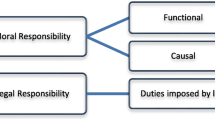Abstract
The increasing costs of healthcare delivery led to different political and administrative approaches trying to preserve the core values of the welfare state. This approach has well documented weaknesses namely with regard to healthcare rationing. The objective of this paper is to evaluate if independent healthcare regulation is an important tool with regard to the construction of fair processes for setting limits to healthcare. Methodologically the authors depart from Norman Daniels’ and James Sabin’s theory of accountability for reasonableness and try to determine if new regulatory models—namely independent agencies—perform better with regard to the public disclosure of the reasons and rationales of healthcare rationing. In publicly financed healthcare systems independent regulation is an important tool to assure fair and reasonable procedures of prioritising services. In accordance with the principle of public accountability, independent regulatory agencies are particularly well suited to assure publicity of the decision-making processes, relevance of the rationale involved and particularly mechanisms for challenge and dispute resolution regarding limit setting decisions. It follows that independent healthcare regulation could be regarded not only as an instrument for performance improvement but also as a tool of social justice. The authors conclude by stating that accountability for reasonableness should be regarded as a landmark of any healthcare reform. And therefore regulators have the social task of assuring that the rationales for limit-setting decisions are clearly accessible to the public.
Similar content being viewed by others
References
Ayres, I., and J. Braithwaite. 1992. Responsive regulation. Transcending the deregulation debate. Oxford: Oxford University Press.
Baldwin, R., and M. Cave. 1999. Understanding regulation. Theory, strategy and practice. Oxford: Oxford University Press.
Boyer, R., and Y. Saillard. 2002. Regulation theory. The state of the art. London: Routledge.
Boyne, G., C. Farrell, J. Law, M. Powell, and M. Walker. 2003. Evaluating public management reforms. Buckingham: Open University Press.
Breyer, S. 1982. Regulation and its reform. Cambridge: Harvard University Press.
Crew, M. 1999. Regulation under increasing competition. Boston: Kluwer Academic Publishers.
Daniels, N. 2007. Rescuing universal health care. The Hastings Center Report 37 (2): 3.
Daniels, N., D. Light, and R. Caplan. 1996. Benchmarks of fairness for health care reform. New York: Oxford University Press.
Daniels, N., and J. Sabin. 1997. Limits to health care: Fair procedures, democratic deliberation, and the legitimacy problem of insurers. Philosophy & Public Affairs 26 (4): 303–350.
Daniels, N., and J. Sabin. 1998. The ethics of accountability in managed care reform. Health Affairs 17 (5): 50–65.
Daniels, N., and J. Sabin. 2002. Setting limits fairly. New York: Oxford University Press.
Donabedian, A. 2003. An introduction to quality assurance in health care. Oxford: Oxford University Press.
Gilardi, F. 2004. Institutional change in regulatory policies: Regulation through independent agencies and the three new institutionalisms. In The politics of regulation. Institutions and regulatory reforms for the age of governance. The CRC series on competition, regulation and development, ed. J. Jordana and D. Levi-Faur. Cheltenham: Edward Elgar Publishing Limited.
Khaleghian, P., and M. Gupta. 2005. Public management and the essential public health functions. World Development 33 (7): 1083–1099.
Kon, J. 2003. Understanding regulation and compliance. London: Securities Institute Services.
Laugesen, M. 2005. Why some market reforms lack legitimacy in health care. Journal of Health Politics, Policy and Law 30 (6): 1065–1100.
Majone, G. 1994. The rise of the regulatory state in Europe. West European Politics 17 (3): 77–101.
Majone, G. 1997. From the positive to the regulatory state. Journal of Public Policy 17 (2): 139–167.
Nunes, R., G. Rego, and C. Brandão. 2007. The rise of independent regulation in health care. Health Care Analysis 15 (3): 169–177.
OECD. 2006. Future budget pressures arising from spending on health and long-term care. Paris: Organisation for Economic Co-operation and Development.
Preker, A., and A. Harding. 2003. A conceptual framework for the organizational reforms of hospitals. In Innovations in health service delivery. The corporatization of public hospitals, ed. A. Preker and A. Harding. Washington: The World Bank.
Saltman, R., and R. Busse. 2002. Balancing regulation and entrepreneurialism in Europe’s health sector: Theory and practice. In European observatory on health care systems, Regulating entrepreneurial behaviour in European health care systems, ed. R. Saltman, R. Busse, and E. Mossialos. Buckingham: Open University Press.
Saltman, R., and J. Figueras. 1997. European health care reform: Analysis of current strategies. Copenhagen: WHO Regional Publications, European Series.
Selznick, P. 1985. Focusing organisational research on regulation. In Regulatory policy and the social sciences, ed. R. Noll. Berkeley: University of California Press.
Sussex, J. 2001. The economics of the private finance initiative in the NHS. London: Office of Health Economics.
Walshe, K. 2002. The rise of regulation in the NHS. British Medical Journal 324: 967–970.
Walshe, K. 2003. Regulating healthcare. A prescription for improvement? State of health series. Maidenhead: Open University Press.
Whincop, M. 2001. Bridging the entrepreneurial financial gap. Linking governance with regulatory policy. Burlington: Ashgate Publishing Limited.
Author information
Authors and Affiliations
Corresponding author
Rights and permissions
About this article
Cite this article
Nunes, R., Rego, G. & Brandão, C. Healthcare regulation as a tool for public accountability. Med Health Care and Philos 12, 257–264 (2009). https://doi.org/10.1007/s11019-008-9177-4
Received:
Accepted:
Published:
Issue Date:
DOI: https://doi.org/10.1007/s11019-008-9177-4



